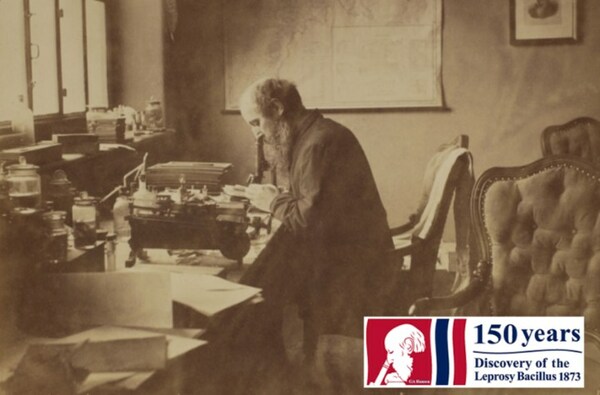TOKYO, Feb. 22, 2023 /PRNewswire/ -- The University of Bergen, Norway and Sasakawa Leprosy (Hansen's Disease) Initiative will hold an event in Bergen on Feb. 28, 2023, to mark the 150th anniversary of Dr. Gerhard Armauer Hansen's discovery of the leprosy bacillus, M. leprae, in 1873. On the same day, there will also be a commemorative webcast.
Among the speakers at the event giving their perspectives on the past, present and future of leprosy will be Mayor of Bergen Linn Kristin Engø, WHO Goodwill Ambassador for Leprosy Elimination Yohei Sasakawa, Dr. Hansen's great-grandson Abbi Patrix, persons affected by leprosy from Brazil and Ghana, and experts from the university and city.
Their remarks, along other presentations on topics including the history of leprosy in Norway, the Bergen Leprosy Archives and Dr. Hansen's legacy today, will be featured in the webcast. Both the physical event and webcast are scheduled to include video messages from WHO Director General Tedros Adhanom Ghebreyesus and Ethiopia Minister of Health Dr. Lia Tadesse.
Details of the event in Bergen can be found on the University of Bergen website: https://www.uib.no/en/ledelsen/157014/armauer-hansen-2023-anniversary
To register for the webcast, visit the Sasakawa Leprosy (Hansen's Disease) Initiative website: https://sasakawaleprosyinitiative.org/latest-updates/initiative-news/3257/

150th Anniversary of Dr. Hansen’s Discovery of M. leprae Is Opportunity to Examine Past, Present and Future of Leprosy
Dr. Gerhard Armauer Hansen first observed the causative agent of leprosy at his laboratory in Bergen on Feb. 28, 1873. His discovery of the M.leprae bacillus was of historic significance, marking the first time that a pathogen had been identified as causing a disease in humans. It also had far-reaching consequences for global health, helping to transform approaches to disease and infection.
Leprosy is a chronic infectious disease that mainly affects the skin and peripheral nerves. It is considered to be one of the oldest diseases in human history and references to it are found in the Bible and other ancient texts. Before the COVID-19 pandemic disrupted case-finding activities, some 200,000 new cases were being reported annually. Until Dr. Hansen's discovery, leprosy was often regarded as a divine punishment or a curse. Its disfiguring effects caused fear and those it affected were isolated and shunned.
The first breakthrough in treatment emerged in the 1940s, but it wasn't until the 1980s—some 100 years after Hansen's discovery—that an effective cure became available in the form of multidrug therapy.
But old images of leprosy remain deep-rooted and the disease is still marked by social stigma. In some parts of the world, persons affected by leprosy face discrimination and restricted opportunities for education, employment and social participation. Meanwhile, fear of stigma may prevent those who suspect they have the disease from seeking treatment, leading their condition to worsen and inviting further discrimination.
In some countries, leprosy is known today as Hansen's disease, in an effort to distance the disease from the negative associations of the term leprosy.
The Feb. 28 event and webcast are part of Sasakawa Leprosy (Hansen's Disease) Initiative's ongoing "Don't Forget Leprosy" campaign launched in 2021 to ensure that leprosy is not overlooked amid the COVID-19 pandemic.
An international symposium on leprosy to be held in Bergen on June 21-22, 2023 as part of the 150th anniversary commemoration of Dr. Hansen's discovery also comes under the campaign.
About the University of Bergen (UiB)
UiB is a medium-sized European University in Norway, with about 18,000 students and 4,000 faculty and staff. Seven faculties cover most of the traditional university disciplines. The faculties include 40 different specialized departments, multidisciplinary research centers and institutes.
About Sasakawa Leprosy (Hansen's Disease) Initiative
The Initiative (https://sasakawaleprosyinitiative.org/) is a strategic alliance between WHO Goodwill Ambassador for Leprosy Elimination Yohei Sasakawa (https://www.nippon-foundation.or.jp/en/who/message/profile), The Nippon Foundation (https://www.nippon-foundation.or.jp/en) and Sasakawa Health Foundation (https://www.shf.or.jp/en) for achieving a world without leprosy and problems related to the disease. Since 1975, The Nippon Foundation and Sasakawa Health Foundation have supported the national leprosy programs of endemic countries through the WHO, with support totaling some US$200 million to date. In cooperation with the Japanese government and other partners, the foundations have played an important role in advocating with the United Nations, helping to secure a 2010 UN General Assembly resolution on elimination of discrimination against persons affected by leprosy and their family members and the appointment of a UN Special Rapporteur on leprosy by the UN Human Rights Council in 2017.
![]() View original content to download multimedia:https://www.prnewswire.com/news-releases/150th-anniversary-of-dr-hansens-discovery-of-m-leprae-is-opportunity-to-examine-past-present-and-future-of-leprosy-301750502.html
View original content to download multimedia:https://www.prnewswire.com/news-releases/150th-anniversary-of-dr-hansens-discovery-of-m-leprae-is-opportunity-to-examine-past-present-and-future-of-leprosy-301750502.html